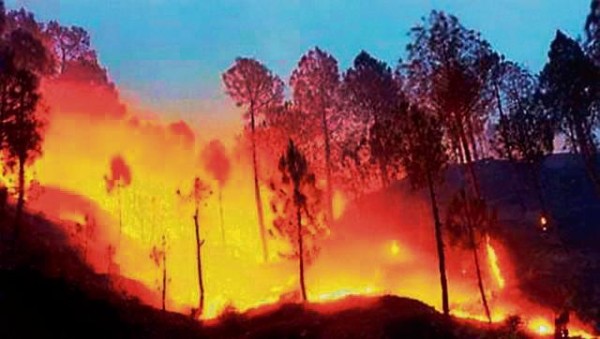In recent months, three environmental catastrophes have forced their way into the national consciousness. The fires in Uttarakhand destroyed thousands of hectares of valuable forests. The ongoing drought in Maharashtra, Bundelkhand and other parts of India, has deprived tens of millions of farmers of irrigation and potable drinking water. The alarmingly high levels of air pollution in our cities are taking a colossal toll on human health. A study last year ranked Delhi the most polluted city in the world; a more recent study put Delhi at number 11, but with four other Indian cities among the five most polluted.
These catastrophes are also crimes, in that they are entirely man-made, a direct consequence of the Central and state governments having disregarded the scientific and social knowledge brought to their attention over the years.
The environmental movement began in the 1970s, with the Chipko Andolan, whose epicentre was the very hills so recently aflame. (Chipko urged that the spread of conifers be stopped, and oak forests protected and enhanced instead — had this been done, these recent fires would not have been so devastating). Chipko was followed by movements around forest rights in other parts of India, and by movements against destructive mining and dam projects as well. Meanwhile, a group of admirably Gandhian constructive workers organised rural communities in reforestation drives and water conservation schemes across India.
Movements like Chipko challenged the reigning economic belief — or superstition — that India was ‘too poor to be green’. In fact, as these movements showed, sustainable management of water, soil, pasture and forests was absolutely critical to the livelihoods of the majority of Indians. These struggles led to the creation in 1980 of a Department of Environment at the Centre (and in time in the States), and to new laws and regulations to forestall environmental abuse by industries whether in the public or private sector. These movements also energised the media, which became extremely sympathetic to their concerns, concerns which were or should have been shared by every Indian with a stake in the well-being of this country.
Another by-product of the environmental movement was the creation of quality scientific institutions. These included the Centre of Ecological Sciences (CES) and the Ashoka Trust of Environment and Ecology (ATREE), both based in Bangalore, both focused on forests and biodiversity. Scientists at Delhi University, JNU, and Jadavpur University began research on soil and water contamination, and air pollution. Other scientists such as AKN Reddy in Bangalore and KR Datye in Mumbai did important work on sustainable energy.
Then, in June 1991 — 25 years ago this month — PV Narasimha Rao took over as prime minister, and the government’s economic policy underwent a radical shift. The ‘licence-permit-quota-Raj’ began to be dismantled, with a freer play given to market forces. This was mostly welcome, for Indian entrepreneurs had been stifled by a bewilderingly complex web of regulations. Economic liberalisation was both necessary and overdue. It unleashed a surge of entrepreneurial energies, spurring economic growth, reducing mass poverty, and solving our chronic foreign exchange problems.
But liberalisation has also had its darker side. The regulations of the industry, commerce, textiles, and other such ministries had to be dismantled — and they mostly were. But the regulations that popular struggles had forced on what was now the ministry of environment and forests remained even more important than before. For, as many studies have shown, it is in the economic interests of private firms to pollute the environment. Nature is an ‘externality’; owned not by the firm but by society at large. So, in order to increase profits, it is perfectly ‘rational’ for entrepreneurs to pollute rivers, destroy forests, damage soils, etc, in the process of producing or marketing products for sale.
And that is precisely what they have done, aided by successive Central and state governments. The environmental regulations so painstakingly put in place in the 1980s remain, but politicians of all parties have allowed them to be wilfully and ubiquitously violated. Meanwhile, newer environmental problems, such as those associated with rapid urbanisation and with climate change, have not generated the necessary legislative or institutional response. So India today is a veritable environmental basket-case; with alarmingly high rates of air and water pollution, the ongoing depletion of aquifers and decimation of forests, and pervasive contamination of the soil.
The guilty men of India’s multiple environmental crises are corrupt politicians and amoral entrepreneurs — in that order. Yet the media cannot escape censure. In the 1980s it did excellent work; from the 1990s, swayed by the prevailing winds, it succumbed to the canard, assiduously promoted by industry lobbies, that environmental regulation was ‘setting India back’. Some leading columnists, either out of ignorance or malevolence (or possibly both), have carried on a vicious campaign against some of our most courageous and public-spirited environmentalists.
Is it too much to hope that the catastrophes of recent months will force a rethink? For in India today, no one is spared the negative effects of environmental abuse — not even the rich. According to one scholarly study, the economic costs of environmental degradation in India amount to as much as $80 billion a year.
Ironically, even as the media has largely abdicated its role as a watchdog, scientific research has developed impressively. The CES, ATREE, Prayas in Pune, research departments at the Jadavpur, Delhi, and other universities — all have excellent scientists whose inputs can greatly help to mitigate these problems. Tragically, this reservoir of scientific expertise has been shamefully neglected by our political class, even though it is entirely Made in India. It is past time that our leaders look to scientists rather than ideologues to forge a path of sustainable development that can safeguard our future as a society, a nation, and a civilisation.
The views expressed are personal



Leave a reply